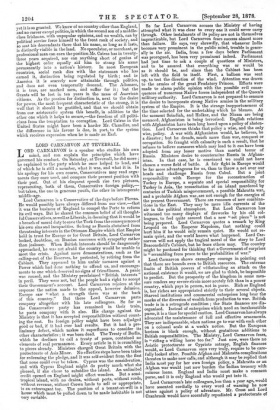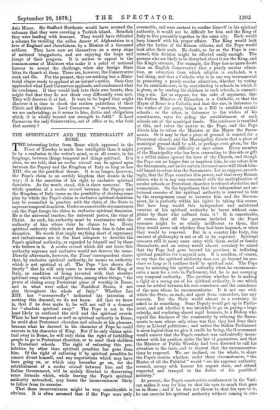LORD CARNARVON AT TEVERSALL. L ORD CARNARVON is a speaker who
studies his own mind, and can explain the principles which have governed his conduct. On Saturday, at Teversall, he did more ; he explained to the party which he once helped to lead, and of which he is still a member, what it was, and what it is. In his apology for his own course, Conservatives may read argu- ments they once used, and compare their present position with their past. Out of his eloquent speech rise two pictures, representing, both of them, Conservative foreign policy,— but taken, the one in generous youth, the other in intemperate middle-age.
Lord Carnarvon is a Conservative of the days before Plevna. He would possibly have always differed from our view,—that it was the business of England to compel the Porte to reform its evil ways. But he shared the common belief of all thought- ful Conservatives, as well as Liberals in deeming that it would be a breach of moral duty to save the Turk from the consequences of his own sins and incapacities. So long as Russia abstained from threatening interests in the Ottoman Empire which that Empire held in trust for Europe or for Great Britain, Lord Carnarvon looked, doubtless, on Russian successes with sympathy rather than jealousy. When British interests should be dangerously approached, he was not afraid the country would be unable to meet the crisis. Against mere demonstrations, such as the calling-out of the Reserves, he protested, by retiring from the Cabinet. They appeared to him unfair menaces against a Power which had done nothing to offend us, and encourage- ments to one which deserved no signs of friendliness. A panic was roused, and the Ministry proclaimed "British interests" in peril. They were not, but the people had a right to accept their Government's account. Lord Carnarvon rejoices at the response the nation made to the appeal, however delusive. Europe saw "what a strength there was at the back of this country." But there Lord Carnarvon parts company altogether with his late colleagues. So far as the Conservative party has remained in their train, he parts company with it also. His charge against the Ministry is that it has accepted responsibilities without count- ing the cost. Its foreign policy might have been adjudged good or bad, if it had ever had results. But it had a pre- liminary defect., which makes it superfluous to consider its other characteristics ; it was born dead. The Treaty of Berlin, which he declines to call a treaty of peace, contained no elements of real permanence. Every article in it is crumbling to pieces already. Ministers charged Great Britain with the protectorate of Asia Minor. No effective steps have been taken for redeeming the pledge, and it was self-evident from the first that none could ever be taken. Cyprus was the consideration, and with Cyprus England might do pretty much what she pleased, if she chose to subsidise the island. An unlimited credit opened on England might effect wonders. But a semi- tropical island, with no drains, without ports, without roads, without revenue, without Crown lands to sell or appropriate, is an extravagant toy. The position of a tenant-at-will in a house which must be pulled down to be made habitable is not very enviable. So far Lord Carnarvon accuses the Ministry of having attempted what it was clear to every one it could never carry through. Other instalments of its policy are not in themselves impracticable, but Lord Carnarvon fears success almost more than failure. He says, very shrewdly, that whenever India becomes very prominent in the public mind, trouble is gener- ally in the air. India, from a few days before Parliament was prorogued, has been very prominent indeed. Parliament had just time to ask a couple of questions of Ministers, and to be assured that everything was or would be as it should be, and since then the Cabinet has been left with the field to itself. First, a balloon was sent up, to test the direction of the wind. Attention was drawn to the armies of the great Feudatory Princes. Efforts were made to alarm public opinion with the possible evil conse- quences of numerous Native forces independent of the Queen's military authority. Lord Carnarvon is not prepared to censure the desire to incorporate strong Native armies in the military system of the Empire. It is the strange inopportuneness of the time selected for the undertaking which he blames. At the moment Scindiah, and Holkar, and the Nizam are being menaced, Afghanistan is being terrorised; English relations with Afghanistan have been long based upon a policy of absten- tion. Lord Carnarvon thinks that policy a wise, and the only wise, policy. A war with Afghanistan would, he believes, be a disaster ; but he dreads, much more than war, conquest or occupation. So fraught with calamity is such a result, that he refuses to believe measures which may lead to it can have been adopted from any lesser motive than mortal terror of Russia. Ministers desire to countermine Russia in Afghan- istan. In that case, he is convinced we could not have chosen a worse field of battle. A fair fight in Europe would be far more advantageous for us, than to throw a net over our heads and challenge Russia from Cabul. But a joint responsibility with Europe for the reconstruction of Turkey in Europe, a separate and special responsibility for Turkey in Asia, the resuscitation of an island murdered by centuries of Turkish misgovernment, a possible Mahratta war, and a probable Afghan war, are not enough for the energies of the present Government. There are rumours of new combina- tions in the East. They may be mere idle currents of the air in the political atmosphere. But Lord Carnarvon has witnessed too many displays of fireworks by his old col- leagues, to feel quite assured that a new "set piece" is not being prepared. Lord Carnarvon quotes a remark by King Leopold on the Emperor Napoleon, that nothing could hurt him if he would only remain quiet. He would not re- main quiet, and the world knows what happened. Lord Car- narvon will not apply the tragical moral of the story to Lord Beaconsfield's Cabinet, but he fears others may. The country might be pardoned for thinking that a Government of surprises is "scrambling from peace to the probabilities of war."
Lord Carnarvon shows exemplary courage in pointing out that there are bounds even to British resources. The extreme limits of British powers of withstanding an attack on the national existence it would, we are glad to think, be impossible to predict. But the prosperity of the kingdom in some mea- sure renders any severe strain more acutely felt than in a poorer country, which pays in person, not in purse. Rich as England is, her riches are appropriated strictly to their several objects. Starved institutions and commercial enterprises long bear the marks of the diversion of wealth from production to war. British trade is in a retrograde condition ; the State finances are dis- organised. Instead of enterprises which need an inexhaustible purse, it is a time for special caution. Lord Carnarvon has always advocated the maintenance of full and effective armaments. They are indispensable, when nations go to war with each other on a colossal scale at a week's notice. But the European horizon is black enough, without gratuitous additions to British responsibilities. The Ministry, Lord Carnarvon fears, is "riding a willing horse too far." Just now, were there no Asiatic protectorate or Cypriote satrapy, English finances would, as Lord Carnarvon says very truly, require to be care- fully looked after. Possible Afghan and Mahratta complications threaten to make new calls, and although it may be replied that India must pay for her own foreign policy, a Mahratta or an Afghan war would just now burden the Indian treasury with ruinous loans. England and India must make a common purse, and it is only England who would put into it.
Lord Carnarvon's late colleagues, less than a year ago, would have assented cordially to every word of warning he now utters against a policy of adventure. Mr. Cross and Lord Cranbrook would have scornfully repudiated a protectorate of Asia Minor. Sir Stafford Northeote would have scorned the calumny that they were coveting a Turkish island. Scindiah they were loading with honours. They would have ridiculed a scheme for recalling the sullen .A,meer of Afghanistan to a love of England and cheerfulness by .a Mission of a thousand soldiers. They have now set themselves on a steep slope of national braggadocio, and are enjoying the leaps and jumps of their progress. It is useless to appeal to the common-sense of Ministers who make it a point of national honour to accept the challenge, when any foreign State bites its thumb at them. There are, however, the Conservative rank and file. For the present, they are nothing but a Minis- terial claque ready to applaud at an instant's notice. Once they applauded what Lord Carnarvon applauds, and condemned what he condemns. If they would look into their own hearts, they might find that they do not think very differently even now. They will discover it at last. It were to be hoped they might discover it in time to check the restless patriotism of their Chiefs and Ministers. Lord Carnarvon is "anxious, because we are undertaking, as it seems to him, duties and obligations which it is wholly beyond our strength to fulfil." Is Lord Carnarvon the only Conservative, out of office or in, who feels that anxiety?































 Previous page
Previous page